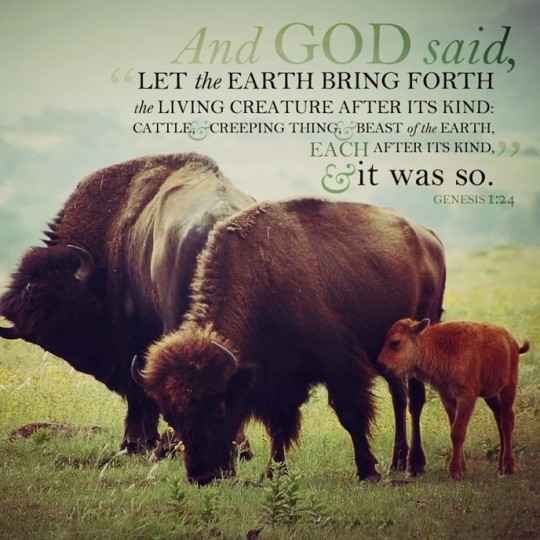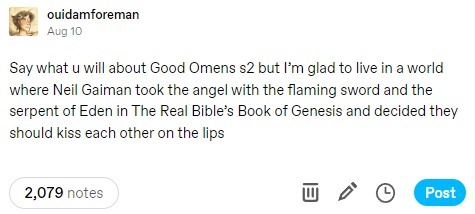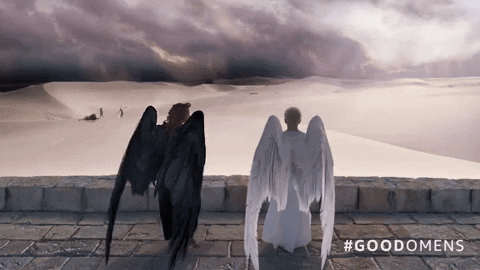#Genesis 1:24
Explore tagged Tumblr posts
Text

Genesis 1:24 (NKJV) - Then God said, “Let the earth bring forth the living creature according to its kind: cattle and creeping thing and beast of the earth, each according to its kind”; and it was so.
95 notes
·
View notes
Text
Happy Transgender Day of Visibility in honor of El Roi, God Who Sees, who made all things, visible and invisible. We know a God of justice and protection, of vulnerability and truth, a God transfigured and transubstantiated, unashamed of scars, breaking gender roles, bringing resurrection. The God who loves us knows firsthand the rotten fruit of political oppression. They have commanded and blessed name changes. They are father and mother, beyond and encompassing our ideas of gender. To all my trans siblings: I am so lucky to know you, to see your God-given gifts, to be present in your joy. I pray today especially for those for whom visibility brings danger, and for those only fully seen by God. The Lord bless you and keep you. The Lord make his face to shine upon you and be gracious to you. The Lord look upon you with favor and give you peace. Amen.
#it is soooo scary right now in my country and i'm in your corner. i'm holding your hand and i love you so much#notes:#debate/disagreement/hot takes can go in my inbox please! not on this post#quoting Genesis 16:13 Colossians 1:16 and Numbers 6:24-26#for name changes see Abram/Abraham Jacob/Israel and Saul/Paul!#and no one ask me if I'm trans the answer is no but yes hope this helps 🙏
360 notes
·
View notes
Text

Feminists, I want to express how I feel when I see all of you (as someone who once held feminist views and disliked men a decade ago, but now that I have gained understanding): Enough with the sabotage!

Be the duty of a woman. -> Genesis 2:18
-> Galatians 3:28 -> 1 Timothy 2:9-15 -> 1 Corinthians 11:3 -> Titus 2:3-5 -> 1 Timothy 2:11-12 -> Ephesians 5:22-24 -> Proverbs 31:11–12 -> Genesis 3:16
#aressida#feminist#memes#pull yourself together#take a step back and observe#women protect men's masculine energy not destroy it#no feminist men#we are not raising or letting them weaker#they are men#men protect women#two genders#address this problem#mothers protect sons#fathers protect sons#boy to man#husband#wife#you will see#1 Timothy 2:11-12#Ephesians 5:22-24#Proverbs 31:11–12#Galatians 3:28#1 Timothy 2:9-15#Genesis 3:16#Genesis 2:18#Titus 2:3-5
10 notes
·
View notes
Text
Words Matter. Read These and See If You Don't Agree
Read every word of this quote, and see if it sounds sane, or crazy. “Jesus said, ‘I am the way, the truth, and the life. No man comes to the Father, but by me.'” (John 14:6, NIV) This short statement is amazingly full, and it’s worth challenging. It’s also worth considering. Depth Not Length First of all, consider the first two words: Jesus SAID. The spoken word is incredibly important in the…
#Genesis 1:3#Jesus#John 14:6#John 15:7#John 17:17#John 6:63#John 6:68#John 8:51#Luke 11:28#Luke 21:33#Luke 9:26#Matthew 7:24#words
2 notes
·
View notes
Text
People up here hype about their hustle and telling others about you can be your best the harder you work. Sorry honey bear, but that's not how God wanted us to live. Because of Adam's being tempted and sinful action of disobedience and listening to Satan instead of God, we are still facing his sin's consequence of working until we drop just so we can eat and have shelter. We were supposed to just live happily with no grind needed as everything we ever need would have been right there for us.
I might get hate for this post. Oh well. Jesus already warned Christians about persecution for following Him. So, I'm cool with it.
#Read Genesis 2: 1-25#Read Genesis 3: 1-24#we were never meant to work or “hustle”#Adam's temptation and disobedience caused this#instead of being proud of how much you work be humble and realize ALL OF THIS WE'RE LIVING IN NOW was not supposed to be#this is called sinful consequence#Christians#God#Jesus#Holy Spirit
4 notes
·
View notes
Text

A Wife for Isaac
1 And Abraham was old, and well stricken in age: and the LORD had blessed Abraham in all things.
2 And Abraham said unto his eldest servant of his house, that ruled over all that he had, Put, I pray you, your hand under my thigh:
3 And I will make you swear by the LORD, the God of heaven, and the God of the earth, that you shall not take a wife unto my son of the daughters of the Canaanites, among whom I dwell:
4 But you shall go unto my country, and to my kindred, and take a wife unto my son Isaac.
5 And the servant said unto him, Perhaps the woman will not be willing to follow me unto this land: must I needs bring your son again unto the land from where you came?
6 And Abraham said unto him, Beware that you bring not my son there again.
7 The LORD God of heaven, who took me from my father's house, and from the land of my kindred, and who spoke unto me, and that swore unto me, saying, Unto your descendants will I give this land; he shall send his angel before you, and you shall take a wife unto my son from there.
8 And if the woman will not be willing to follow you, then you shall be clear from this my oath: only bring not my son there again.
9 And the servant put his hand under the thigh of Abraham his master, and swore to him concerning that matter.
10 And the servant took ten camels of the camels of his master, and departed; for all the goods of his master were in his hand: and he arose, and went to Mesopotamia, unto the city of Nahor.
11 And he made his camels to kneel down outside the city by a well of water at the time of the evening, even the time that women go out to draw water.
12 And he said, O LORD God of my master Abraham, I pray you, send me good speed this day, and show kindness unto my master Abraham.
13 Behold, I stand here by the well of water; and the daughters of the men of the city come out to draw water:
14 And let it come to pass, that the damsel to whom I shall say, Let down your pitcher, I pray you, that I may drink; and she shall say, Drink, and I will give your camels drink also: let the same be she that you have appointed for your servant Isaac; and thereby shall I know that you have showed kindness unto my master.
15 And it came to pass, before he had done speaking, that, behold, Rebekah came out, who was born to Bethuel, son of Milcah, the wife of Nahor, Abraham's brother, with her pitcher upon her shoulder.
16 And the damsel was very fair to look upon, a virgin, neither had any man known her: and she went down to the well, and filled her pitcher, and came up.
17 And the servant ran to meet her, and said, Let me, I pray you, drink a little water of your pitcher.
18 And she said, Drink, my lord: and she hastened, and let down her pitcher upon her hand, and gave him drink.
19 And when she had finished giving him drink, she said, I will draw water for your camels also, until they have finished drinking.
20 And she hastened, and emptied her pitcher into the trough, and ran again unto the well to draw water, and drew for all his camels.
21 And the man wondering at her held his peace, to learn whether the LORD had made his journey prosperous or not.
22 And it came to pass, as the camels had finished drinking, that the man took a golden earring of half a shekel weight, and two bracelets for her hands of ten shekels weight of gold;
23 And said, Whose daughter are you? tell me, I pray you: is there room in your father's house for us to lodge in?
24 And she said unto him, I am the daughter of Bethuel the son of Milcah, whom she bore unto Nahor.
25 She said moreover unto him, We have both straw and fodder enough, and room to lodge in.
26 And the man bowed down his head, and worshiped the LORD.
27 And he said, Blessed be the LORD God of my master Abraham, who has not left destitute my master of his mercy and his truth: I being in the way, the LORD led me to the house of my master's kinsmen.
28 And the damsel ran, and told them of her mother's house these things.
29 And Rebekah had a brother, and his name was Laban: and Laban ran out unto the man, unto the well. — Genesis 24:1-29 | King James 2000 Bible (KJB2K) The King James 2000 Bible, copyright © Doctor of Theology Robert A. Couric 2000, 2003. All rights reserved. Cross References: Genesis 11:29; Genesis 12:11; Genesis 12:17; Genesis 22:20; Genesis 25:20; Genesis 26:24; Genesis 29:2; Genesis 29:5; Genesis 29:12; Genesis 39:4; Genesis 42:27; Exodus 2:16; Exodus 4:31; Exodus 32:2-3; Joshua 2:17; 1 Samuel 14:10; Luke 1:68; John 4:7; 2 Corinthians 6:14; Galatians 3:9; Hebrews 11:15
Read full chapter
Genesis 24 Bible Commentary - Matthew Henry (complete)
#wife#chosen#Rebekah#Isaac#Genesis 24:1-29#Book of Genesis#Old Testament#KJB2K#King James 2000 Bible
3 notes
·
View notes
Text
"YES, GOD CAN STILL USE YOU!"
Ephesians 2:10, “For we are His workmanship [His own master work, a work of art], created in Christ Jesus [reborn from above – spiritually transformed, renewed, READY TO BE USED] for good words, which God prepared [for us] beforehand [taking paths which He set], so that we would walk in them [living the good life which He prearranged and made ready for us].” (AMP) When David first arrived at…

View On WordPress
#1 Samuel 10:22#1 Timothy 4:12#2 Chronicles 24:1#2 Kings 5:1-3#2 Timothy 2:20#2 Timothy 2:21#Acts 20:9-11#Believers#Bible Study#Church#Colossians 3:22-25#Encouragement#Ephesians 2:10#Esther 4:14#Faith#Genesis 41:41-43#God#Hebrews 13:6#Holy Spirit#Isaiah 43:18-19#Isaiah 6:8#Jeremiah 18:1-6#Jesus Christ#Joseph#Luke 1:38#Matthew 25:23#Numbers 33:39#Philippians 3:12-14#Philippians 4:13#Proverbs 18:16
5 notes
·
View notes
Text
Revelation 21: How Firm a Foundation
There are several clues in John’s vision of a voluminous golden city descending through the sky that lead the reader to believe it symbolizes spiritual truths. #Revelation21 #NewJerusalem #TwelveFoundations #PearlyGates
There are several clues in John’s vision of a voluminous golden city descending through the sky that lead the reader to believe it symbolizes spiritual truths. In comparison to Babylon—portrayed as a woman of excesses—the bride motif of new Jerusalem symbolizes the far superior role as Christ’s beloved, than as the world’s. The purity and luminosity of the precious materials in the city’s…

View On WordPress
#1 Peter 1:7#bride of christ#bride of the lamb#Ephesians 2:19-22#Ezekiel 40:3#Genesis 2:10-12#hebrews 10:19-20#Hebrews 3:6#Hebrews 6:19#how firm a foundation#John 14:2#Matthew 7:24-27#new jerusalem#pearl of great price#revelation 21#twelve foundations#wall of salvation#Zechariah 13:9
0 notes
Text
Jesus : The Only Way To The Father (Easter Message) (239) - March 30 2024
Play on other Podcast Apps This Easter program we celebrate the tremendous sacrifice of our Lord Jesus Christ, who became the Ransom for Many according to Matthew 20:28 (AMPC), so that the world might find salvation and be made safe and sound through Him (John 3:17, AMPC). This program covers the following Scriptures from the Amplified Classic version (AMPC): John 3:16-17; Hebrews 1:3; John…

View On WordPress
#1 Corinthians 6:9-10#1 John 3:1-2#1 John 3:8#1 Peter 3:19#2 Corinthians 5:17#2 Peter 3:9#Acts 2:24#blood#chains#christ#christ is risen#Colossians 2:12#deliverance#easter#Ephesians 1:21#Ephesians 2:1-6#Ephesians 2:9#Ephesians 4:8-10#father#free#Galatians 2:20#Genesis 3:6#god#Hebrews 1:3#Hebrews 9:12-14#Jeremiah 17:9#Jesus#John 1:12#John 3:1-21#john 3:16-17
0 notes
Text
Awhile ago @ouidamforeman made this post:

This shot through my brain like a chain of firecrackers, so, without derailing the original post, I have some THOUGHTS to add about why this concept is not only hilarious (because it is), but also...
It. It kind of fucks. Severely.
And in a delightfully Pratchett-y way, I'd dare to suggest.
I'll explain:
As inferred above, both Crowley AND Aziraphale have canonical Biblical counterparts. Not by name, no, but by function.
Crowley, of course, is the serpent of Eden.
(note on the serpent of Eden: In Genesis 3:1-15, at least, the serpent is not identified as anything other than a serpent, albeit one that can talk. Later, it will be variously interpreted as a traitorous agent of Hell, as a demon, as a guise of Satan himself, etc. In Good Omens --as a slinky ginger who walks funny)
Lesser known, at least so far as I can tell, is the flaming sword. It, too, appears in Genesis 3, in the very last line:
"So he drove out the man; and placed at the east of the garden of Eden Cherubims, and a flaming sword which turned every way, to keep the way of the tree of life." --Genesis 3:24, KJV
Thanks to translation ambiguity, there is some debate concerning the nature of the flaming sword --is it a divine weapon given unto one of the Cherubim (if so, why only one)? Or is it an independent entity, which takes the form of a sword (as other angelic beings take the form of wheels and such)? For our purposes, I don't think the distinction matters. The guard at the gate of Eden, whether an angel wielding the sword or an angel who IS the sword, is Aziraphale.
(note on the flaming sword: in some traditions --Eastern Orthodox, for example-- it is held that upon Christ's death and resurrection, the flaming sword gave up it's post and vanished from Eden for good. By these sensibilities, the removal of the sword signifies the redemption and salvation of man.
...Put a pin in that. We're coming back to it.)
So, we have our pair. The Serpent and the Sword, introduced at the beginning and the end (ha) of the very same chapter of Genesis.
But here's the important bit, the bit that's not immediately obvious, the bit that nonetheless encapsulates one of the central themes, if not THE central theme, of Good Omens:
The Sword was never intended to guard Eden while Adam and Eve were still in it.
Do you understand?
The Sword's function was never to protect them. It doesn't even appear until after they've already fallen. No... it was to usher Adam and Eve from the garden, and then keep them out. It was a threat. It was a punishment.
The flaming sword was given to be used against them.
So. Again. We have our pair. The Serpent and the Sword: the inception and the consequence of original sin, personified. They are the one-two punch that launches mankind from paradise, after Hell lures it to destruction and Heaven condemns it for being destroyed. Which is to say that despite being, supposedly, hereditary enemies on two different sides of a celestial cold war, they are actually unified by one purpose, one pivotal role to play in the Divine Plan: completely fucking humanity over.
That's how it's supposed to go. It is written.
...But, in Good Omens, they're not just the Serpent and the Sword.
They're Crowley and Aziraphale.
(author begins to go insane from emotion under the cut)
In Good Omens, humanity is handed it's salvation (pin!) scarcely half an hour after losing it. Instead of looming over God's empty garden, the sword protects a very sad, very scared and very pregnant girl. And no, not because a blameless martyr suffered and died for the privilege, either.
It was just that she'd had such a bad day. And there were vicious animals out there. And Aziraphale worried she would be cold.
...I need to impress upon you how much this is NOT just a matter of being careless with company property. With this one act of kindness, Aziraphale is undermining the whole entire POINT of the expulsion from Eden. God Herself confronts him about it, and he lies. To God.
And the Serpent--
(Crowley, that is, who wonders what's so bad about knowing the difference between good and evil anyway; who thinks that maybe he did a GOOD thing when he tempted Eve with the apple; who objects that God is over-reacting to a first offense; who knows what it is to fall but not what it is to be comforted after the fact...)
--just goes ahead and falls in love with him about it.
As for Crowley --I barely need to explain him, right? People have been making the 'didn't the serpent actually do us a solid?' argument for centuries. But if I'm going to quote one of them, it may as well be the one Neil Gaiman wrote ficlet about:
"If the account given in Genesis is really true, ought we not, after all, to thank this serpent? He was the first schoolmaster, the first advocate of learning, the first enemy of ignorance, the first to whisper in human ears the sacred word liberty, the creator of ambition, the author of modesty, of inquiry, of doubt, of investigation, of progress and of civilization." --Robert G. Ingersoll
The first to ask questions.
Even beyond flattering literary interpretation, we know that Crowley is, so often, discreetly running damage control on the machinations of Heaven and Hell. When he can get away with it. Occasionally, when he can't (1827).
And Aziraphale loves him for it, too. Loves him back.
And so this romance plays out over millennia, where they fall in love with each other but also the world, because of each other and because of the world. But it begins in Eden. Where, instead of acting as the first Earthly example of Divine/Diabolical collusion and callousness--
(other examples --the flood; the bet with Satan; the back channels; the exchange of Holy Water and Hellfire; and on and on...)
--they refuse. Without even necessarily knowing they're doing it, they just refuse. Refuse to trivialize human life, and refuse to hate each other.
To write a story about the Serpent and the Sword falling in love is to write a story about transgression.
Not just in the sense that they are a demon and an angel, and it's ~forbidden. That's part of it, yeah, but the greater part of it is that they are THIS demon and angel, in particular. From The Real Bible's Book of Genesis, in the chapter where man falls.
It's the sort of thing you write and laugh. And then you look at it. And you think. And then you frown, and you sit up a little straighter. And you think.
And then you keep writing.
And what emerges hits you like a goddamn truck.
(...A lot of Pratchett reads that way. I believe Gaiman when he says Pratchett would have been happy with the romance, by the way. I really really do).
It's a story about transgression, about love as transgression. They break the rules by loving each other, by loving creation, and by rejecting the hatred and hypocrisy that would have triangulated them as a unified blow against humanity, before humanity had even really got started. And yeah, hell, it's a queer romance too, just to really drive the point home (oh, that!!! THAT!!!)
...I could spend a long time wildly gesturing at this and never be satisfied. Instead of watching me do that (I'll spare you), please look at this gif:

I love this shot so much.
Look at Eve and Crowley moving, at the same time in the same direction, towards their respective wielders of the flaming sword. Adam reaches out and takes her hand; Aziraphale reaches out and covers him with a wing.
You know what a shot like that establishes? Likeness. Commonality. Kinship.
"Our side" was never just Crowley and Aziraphale. Crowley says as much at the end of season 1 ("--all of us against all of them."). From the beginning, "our side" was Crowley, Aziraphale, and every single human being. Lately that's around 8 billion, but once upon a time it was just two other people. Another couple. The primeval mother and father.
But Adam and Eve die, eventually. Humanity grows without them. It's Crowley and Aziraphale who remain, and who protect it. Who...oversee it's upbringing.
Godfathers. Sort of.
#good omens#ineffable husbands#aziracrow#good omens 2#crowley#aziraphale#good omens meta#I have no idea if I've made a coherent point here but I'm tired of this being in my drafts; RAW FEELINGS IT IS#it's about being sent to destroy and instead staying to love and protect and nurture I'M CRAZY I'M CRAZY RAAAAAAAGGHHHH#gnu terry pratchett
27K notes
·
View notes
Text
Who is that man in the field coming to meet us?
Daily Verse Reading – Genesis 23: 1-4; 19; 24: 1-8; 62-67 Genesis 23:1-4 The Death of Sarah23 Sarah lived to be a hundred and twenty-seven years old. 2 She died at Kiriath Arba (that is, Hebron) in the land of Canaan, and Abraham went to mourn for Sarah and to weep over her. 3 Then Abraham rose from beside his dead wife and spoke to the Hittites.[a] He said, 4 “I am a foreigner and stranger…

View On WordPress
0 notes
Note
Blast the Book of Genesis, Chapter 1 from the Bible so we can finally know what was the first creature God created.
[1:1] In the beginning when God created the heavens and the earth,
[1:2] the earth was a formless void and darkness covered the face of the deep, while a wind from God swept over the face of the waters.
[1:3] Then God said, "Let there be light"; and there was light.
[1:4] And God saw that the light was good; and God separated the light from the darkness.
[1:5] God called the light Day, and the darkness he called Night. And there was evening and there was morning, the first day.
[1:6] And God said, "Let there be a dome in the midst of the waters, and let it separate the waters from the waters."
[1:7] So God made the dome and separated the waters that were under the dome from the waters that were above the dome. And it was so.
[1:8] God called the dome Sky. And there was evening and there was morning, the second day.
[1:9] And God said, "Let the waters under the sky be gathered together into one place, and let the dry land appear." And it was so.
[1:10] God called the dry land Earth, and the waters that were gathered together he called Seas. And God saw that it was good.
[1:11] Then God said, "Let the earth put forth vegetation: plants yielding seed, and fruit trees of every kind on earth that bear fruit with the seed in it." And it was so.
[1:12] The earth brought forth vegetation: plants yielding seed of every kind, and trees of every kind bearing fruit with the seed in it. And God saw that it was good.
[1:13] And there was evening and there was morning, the third day.
[1:14] And God said, "Let there be lights in the dome of the sky to separate the day from the night; and let them be for signs and for seasons and for days and years,
[1:15] and let them be lights in the dome of the sky to give light upon the earth." And it was so.
[1:16] God made the two great lights - the greater light to rule the day and the lesser light to rule the night - and the stars.
[1:17] God set them in the dome of the sky to give light upon the earth,
[1:18] to rule over the day and over the night, and to separate the light from the darkness. And God saw that it was good.
[1:19] And there was evening and there was morning, the fourth day.
[1:20] And God said, "Let the waters bring forth swarms of living creatures, and let birds fly above the earth across the dome of the sky."
[1:21] So God created the great sea monsters and every living creature that moves, of every kind, with which the waters swarm, and every winged bird of every kind. And God saw that it was good.
[1:22] God blessed them, saying, "Be fruitful and multiply and fill the waters in the seas, and let birds multiply on the earth."
[1:23] And there was evening and there was morning, the fifth day.
[1:24] And God said, "Let the earth bring forth living creatures of every kind: cattle and creeping things and wild animals of the earth of every kind." And it was so.
[1:25] God made the wild animals of the earth of every kind, and the cattle of every kind, and everything that creeps upon the ground of every kind. And God saw that it was good.
[1:26] Then God said, "Let us make humankind in our image, according to our likeness; and let them have dominion over the fish of the sea, and over the birds of the air, and over the cattle, and over all the wild animals of the earth, and over every creeping thing that creeps upon the earth."
[1:27] So God created humankind in his image, in the image of God he created them; male and female he created them.
[1:28] God blessed them, and God said to them, "Be fruitful and multiply, and fill the earth and subdue it; and have dominion over the fish of the sea and over the birds of the air and over every living thing that moves upon the earth."
[1:29] God said, "See, I have given you every plant yielding seed that is upon the face of all the earth, and every tree with seed in its fruit; you shall have them for food.
[1:30] And to every beast of the earth, and to every bird of the air, and to everything that creeps on the earth, everything that has the breath of life, I have given every green plant for food." And it was so.
[1:31] God saw everything that he had made, and indeed, it was very good. And there was evening and there was morning, the sixth day.
String identified:
[1:1] t gg G cat t a a t at,
[1:2] t at a a a a c t ac t , a G t t ac t at.
[1:3] T G a, "t t gt"; a t a gt.
[1:4] A G a tat t gt a g; a G aat t gt t a.
[1:5] G ca t gt a, a t a ca gt. A t a g a t a g, t t a.
[1:6] A G a, "t t a t t t at, a t t aat t at t at."
[1:7] G a t a aat t at tat t t at tat a t . A t a .
[1:8] G ca t . A t a g a t a g, t c a.
[1:9] A G a, "t t at t gat tgt t ac, a t t a aa." A t a .
[1:10] G ca t a at, a t at tat gat tgt ca a. A G a tat t a g.
[1:11] T G a, "t t at t t gtat: at g , a t t at tat a t t t t." A t a .
[1:12] T at gt t gtat: at g , a t ag t t t t. A G a tat t a g.
[1:13] A t a g a t a g, t t a.
[1:14] A G a, "t t gt t t t aat t a t gt; a t t g a a a a a a,
[1:15] a t t gt t t t g gt t at." A t a .
[1:16] G a t t gat gt - t gat gt t t a a t gt t t gt - a t ta.
[1:17] G t t t t t g gt t at,
[1:18] t t a a t gt, a t aat t gt t a. A G a tat t a g.
[1:19] A t a g a t a g, t t a.
[1:20] A G a, "t t at g t a g cat, a t a t at ac t t ."
[1:21] G cat t gat a t a g cat tat , , t c t at a, a g . A G a tat t a g.
[1:22] G t, ag, " t a t a t at t a, a t t t at."
[1:23] A t a g a t a g, t t a.
[1:24] A G a, "t t at g t g cat : catt a cg tg a aa t at ." A t a .
[1:25] G a t aa t at , a t catt , a tg tat c t g . A G a tat t a g.
[1:26] T G a, "t a a ag, accg t ; a t t a t t a, a t t a, a t catt, a a t aa t at, a cg tg tat c t at."
[1:27] G cat a ag, t ag G cat t; a a a cat t.
[1:28] G t, a G a t t, " t a t, a t at a t; a a t t a a t t a a g tg tat t at."
[1:29] G a, ", a g at g tat t ac a t at, a t t t t; a a t .
[1:30] A t at t at, a t t a, a t tg tat c t at, tg tat a t at , a g g at ." A t a .
[1:31] G a tg tat a a, a , t a g. A t a g a t a g, t t a.
Closest match: Naumovozyma dairenensis CBS 421 chromosome 11, complete genome Common name: Budding yeast
(I could not find an image of this organism, so here is an image of Naumovozyma castellii instead.)

#tumblr genetics#genetics#asks#requests#sent to me#christianity#yeast#long post#such a massive post for absolutely no payoff LMAO
1K notes
·
View notes
Text
Action Equals Faith; Faith Always Equals Action
Newton’s law of motion says that for whenever an object exerts force on another object, the second object exerts an equal and opposite reaction upon the first. (https://www1.grc.nasa.gov/beginners-guide-to-aeronautics/newtons-laws-of-motion/ ) Perhaps you never thought of it, but there is also a spiritual law of motion: for every particle of faith, there is a corresponding action. One cannot…
#Abraham#action#faith#Genesis 12:1#James 2:17-18#Matthew 10:38#Matthew 16:24#Matthew 19:21#Matthew 4:19#Matthew 8:22
0 notes
Text
Faithfulness Inverted (1 Sam 14:24-46)
Faithfulness Inverted (1 Sam 14:24-46)
The following is an unedited sermon manuscript; for an explanation of my sermon manuscripts, click here.*Originally preached November 6th, 2022* What makes a good leader? Who do you want to follow? Someone with vision, grit, conviction, someone who isn’t afraid to break the rules and push out into the unknown? Is it creativity, or courage, or charisma? Is it the ability to draw a crowd, to…

View On WordPress
0 notes
Text
I watched James Somerton's final video, and all I got was this 6 page document
As soon as I learned his final unreleased video was on Revolutionary Girl Utena, I knew I had to hate watch it. I didn't know that I'd spend the following 4 hours making a comprehensive doc on everything I hated about it. But here we are.
The TLDR (is this too long to be a TLDR?)
The intro section, as well as Part 2, are directly plagiarized from wikipedia. The rest is unclear.
He makes a “haha this show is so weird right guys” joke 10 different times
He reads Anthy as so emotionally stunted she literally has to be taught how to think for herself, and believes that being the rose bride makes her feel good
He says that his reading is ‘vastly different” from the rest of the community, before boldly stating that this is because he sees it as a “deeply allegorical and symbolic story”
He sees the sexual abuse as “not to be taken literally”
Insists that the show be separated into parts that are strictly literal and strictly allegorical for the entirety of parts 3 and 4, before making the contradictory move of analyzing characters as allegories during part 5
The only characters that get dedicated sections are Akio and Dios, who he doesn’t believe are the same person.
He says Dios gets his powers by “deflowering women”
He calls Akio, known child predator, a chaotic bisexual
Uses 14 year old SA survivor Anthy’s passive personality to make a joke about her being a bottom
His final point is that Utena was the real prince all along
There are no citations
Anyway, full version for people who hate themselves under the cut. With time codes, because I cite my sources.
Part 1: Intro
This entire section is almost exclusively quoted from the Wikipedia article for Revolutionary Girl Utena. Words have been changed, but the order at which certain topics come up is not. Highlights include:
0:56 In his introduction of Be-Papas, lists the founding members in literally the exact same order as Wikipedia.
1:40-2:00 His list of Be-Papas previous works is lifted entirely from wikipedia, only with the words changed. This leads to a strange moment at 1:52 where he claims Be-papas ‘lent their talents to’ Neon Genesis Evangelion, a show which started production at least a year before Be-papas was founded. On the wikipedia article for Utena, this is instead referring to the previous work of Shinya Hasegawa and Yōji Enokido
4:23 he uses a quote by Yūichirō Oguro describing the production as a “tug of war”. He seems to have lifted this in its entirety from Wikipedia, as he does not cite the actual source it is from (the box set companion book, btw)
As for James Somerton originals, at 0:44 he claims that out of all magical girl series,”none to my knowledge have been more discussed and dissected than the 1997 series Revolutionary Girl Utena” He will go back on this at 5:05, where he states that “Sailor Moon takes the lion’s share of discussion” in regard to influential magical girl anime
Part 2: Part 1
(At least I know I’m not funny, unlike James Somerton)
Speaking of which. Here is every single time he makes a “wow this show is sooooo weird you guys” joke: 6:00, 8:50, 10:40, 10:58, 13:46, 17:07, 24:16, 30:34, 41:19, 48:01
Here’s every time the punchline to the joke is the existence of Nanami, a character who he otherwise completely disregards: 10:56, 12:05, 16:22, 42:40
6:16 Claims that the “Apocalypse saga” and “Akio Ohtori saga’ are two names for the same several episodes, depending on the release. This is untrue. Instead, different releases either only have the Apocalypse saga, or split the episodes into an Akio Ohtori saga and then the Apocalypse saga.
7:58 Claims Utena intervening on Anthy’s behalf begins the first duel. While this happens in the movie, Touga intervenes in the scene he uses clips from (like literally right after the shot he uses in the video). Utena only gets drawn into the duels when Wakaba’s love note to Saionji is posted. Youtuber Noralities’ Utena video also gets this wrong, which makes me wonder if this was copied.
9:09 Claims Akio’s “End of the World” moniker is actually more closely translated to “Apocalypse”. In reality, the translation moves away from a more apocalyptic reading, with 世界の果て (Sekai no hate) apparently translating closer to “the furthest reach of a known world” or “edge of the world”. (Love the implications of this translation, but I digress)
9:10 As can be assumed from the previous point, this means I can’t find any sources that point to them not using the title “apocalypse” for religious reasons
10:10 Uses Anthy’s extreme passivity under her Rose bride persona to make a top/bottom joke. I’m gonna repeat this in case you’re just skimming. He uses a trait that likely stems from years of abuse, (possibly exaggerated by the persona Anthy uses to manipulate people), and uses it to call her a bottom.
He also just doesn’t seem to understand how the whole point of Utena constantly telling Anthy that she's just a normal girl who should make more friends is framed as Utena imposing her will on Anthy, just as much as the previous Engaged have done.
11:54 Apologies in advance for my most “um, actually!” point yet, but technically his statement that Anthy stops being host to the Sword of Dios is wrong. Akio literally pulls a sword out of her chest in the final duel. It's a more evil-looking sword of Dios, granted.
13:02 !!! CANTARELLA SCENE ALERT !!! He interprets it as them fighting over Akio?? Which like. I will allow people to have their own interpretations of vague and symbolic scenes. I will. I swear. This is not technically incorrect. It just makes me want to eat my own intestines.
14:44 Bad Anthy take #1: He states Anthy “is emotionally stunted to the point where she needs people to make decisions for her because she does not know how to think for herself” This ignores several moments of Anthy clearly making her own choices throughout the show, including the suicide attempt Somerton mentions about a minute prior. This also strips Anthy of what little agency she has throughout the story, usually exerted through messing with Utena or Nanami. (The fact that she repeatedly makes choices that contribute to her own abuse is, in my opinion, one of the most interesting parts of her character, and it's a shame that Summerton’s ���reading’ of the story completely disregards that)
Additionally, he once again reads Utena ‘urging Anthy to think for herself” in the first arc as an unambiguously good move, and not as something critiqued in the show.
14:52 Summerton reads the Swords of hatred as symbolizing men’s hatred specifically. Again, I’m trying not to completely disregard differing interpretations to a show like Utena, but this feels very simplistic, especially considering the harm we see aimed towards Anthy by other women
16:42 Here he claims that his reading of the story seems to be “vastly different” from the bulk of Utena discourse. What is this reading? That the show shouldn’t be read literally. Or, in his words, “[we can interpret] Revolutionary Girl Utena as a deeply allegorical and symbolic story about the struggles of coming of age amidst widespread institutional corruption in a high school and which describes a passive culture of inaction in regard to brazen instances of domestic exploitation in which there is not only a question about the caporeality of the events transpiring but also which events can be taken for granted and which events are meant to signify abstract sociological institutions.” The idea that he believes this is in any way a new reading of the material honestly baffles me.
Part 3: Part 2
17:48 through 18:50 differently quotes the Wikipedia article for postmodernism. He even makes a joke at 17:55 about Wikipedia. Please kill me.
The first three themes he lists at 19:11 are just the three main themes listed on the Revolutionary Girl Utena Wikipedia page. What was that about a “vastly different” reading, James?
You’re gonna have to take my word for it, but this section is so short because it's just him talking about the various ways the story can’t be taken literally. He does, ironically, call this a hot take.
Part 4: Part 3
Here’s where the reading falls apart folks
At 23:15, he states that some things in Utena are allegorically coded, while others are to be taken literally. This is true. However, he seems to take this to mean that some parts of the show are Strictly Literal, while others are Strictly Allegorical for things going on in the Literal World.
This is apparently why he prefers the Anime to the Movie, where there basically is no separation between the Literal and Allegorical
This take is bizarre to me for several reasons, but here is my favorite. At several points, he mentions how Revolutionary Girl Utena is a work of Magical Realism. Magical Realism is literally defined by its blending of the “literal” and “allegorical”, the mix of fantastical elements in a mundane, realistic setting. This idea of the impossibility of a blurred line, that Utena must either have lore where the magic is all real and means nothing, or dedicated allegory segments quarantined from the rest of the story, is contrary to the very idea of Magical Realism.
I can’t help but wonder if Somerton took his mentions of Magical realism from a previous work, due to how little it is consistent with his final argument. Either way, this section suggests a great lack of creativity in his analysis, a shame for such a creative work.
24:36: Shiori slander, for those who care
After this he gets really worked up about people assuming symbolism in everything, even when the author ‘doesn’t make it clear something is symbolic’. He shuts down a reading of a shot in the Lord of the Rings. Miley Cyrus is there? Very The Curtains Were Blue of him.
28:22 Claims that Wakaba is the key to telling where the Strictly Literal segments end and the Strictly Allegorical segments begin. He states that, under this lens, deeply personal moments of character suffering such as all of the sexual abuse and Anthy’s suicide attempt (which he literally cites) should be read as symbolic and be “approached with uncertainty rather than confusion”. (28:24-29:13)
This also somewhat falls apart when you consider Wakaba is the jeep in the movie's car chase
And then he rants about people not liking his Attack on Titan video for a bit. Since its potential symbolism also doesn't follow hard enough rules to be symbolism. Once again, the separation of “fact vs allegory” I haven’t watched AOT, so that's all I’ll say.
Part 5: Part 4
Thank god this part is short. Much like Dios’ on-screen presence.
32:55 Makes the extremely bold claim that Dios is not Akio. As in, never even became Akio. because Dios is Strictly Allegorical.
Just to be a pedant, this is pretty explicitly disproven in the show



Confusingly, both earlier and later he will address these two as the same character.
33:04 he also explains the root of Akio’s name in a tone that suggests this is supplemental information and not like. Literally something he explains out loud in the show?
Part 6: Part 5
This section is nearly entirely about Akio Ohtori. I would like to note that him and Dios are the only characters with dedicated segments.
38:30 The part where he states that Dios gets his powers from deflowering women.
38:46 Claims, once again, that Akio’s abuse of Anthy “may not be literal”.
38:59 “the instance of exploitation here is used because assault has deep roots as indicating that akio's gender is the source of his imbalance” THE ASSAULT IS ABOUT AKIO NOW???
39:45 Bad Anthy take #2: “Anthy’s conformity to the Rose bride is based around the fact that she feels good being subservient because this is the only thing in her life that has ever brought her any kind of positive reward”. This is a direct quote. Anyway, I can’t think of any instances in the show where Anthy’s subservience gives her a positive reward, except maybe when she’s intentionally using it to manipulate others. As for her feeling good being the rose bride. She tries to commit suicide. Dude.
Side tangent, but isn’t this exactly what Akio says during the final 2 episodes? That Anthy enjoys being a witch? Is the main villain, who consistently says things during that very episode that are blatantly false, our source of information for this take? I guess so, since this is the dedicated Akio section.
At 40:20 he decides to introduce the concept of Anthy, Akio, and Utena as stand-ins for wider concepts, which is antithetical to his approach in analysis beforehand
Part 7: Part 6
42:40 he finally acknowledges that he’s been spending too much time talking about Akio, and literally no time on characters like Nanami
46:10 states that Utena’s exclusive motivation “is to protect Anthy from the predatorial intentions of the other dualists”, which disregards the fact, which she states herself, that she was largely participating in the duels and protecting Anthy to feel like a prince
48:04 The part where he says that Akio has ‘chaotic Bi vibes’ in regards to him sleeping with Touga, who is 17 and implied to be a long-term victim
Part 8: Part 7
54:01: His concluding point is that Utena was the real prince all along.
In true Somerton fashion, the video then ends over a scrolling wall of patrons, with not a single citation in sight.
#the autism won again you guys#revolutionary girl utena#james somerton#shoujo kakumei utena#utena#anthy#hbomberguy
2K notes
·
View notes
